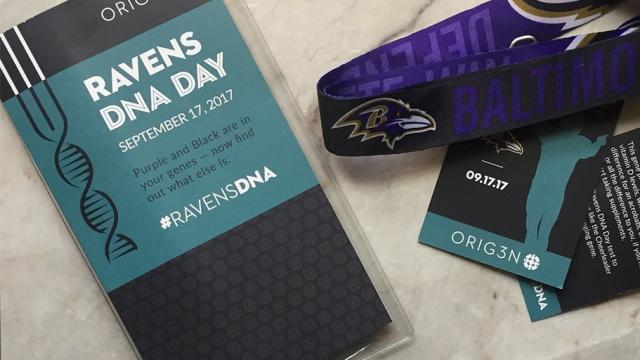Image: Orig3n
You may have never wondered what’s in the DNA of a football fan, but the US Baltimore Ravens team planned to find out. As part of a bizarre game-day promotion on Sunday, the Ravens partnered with consumer genetic testing company Orig3n to give away free DNA test kits to 55,000 fans as they entered the stadium. But the plan was hastily abandoned just a few hours before kick off, amid concerns about privacy and an inquiry from the federal government about whether the company’s labs lacked necessary certifications.
Orig3n had planned to offer cheek swabs and genetic analysis testing for four different genes, including one purportedly intended to assess athletic abilities. The company sells similar tests through its online store, including a $US29 ($36) test meant to assess your “Superhero” skills and equally dubious tests to assess fitness and nutrition. As Ravens fans settled in for a home game against the Cleveland Browns, they could complete their cheeks swabs, then drop them in boxes throughout the stadium. “Purple and black are in your genes,” ads for the promotion read. “Now find out what else is.”
The promotion, though, quickly attracted attention from those wary of the ways in which a mass collection of DNA data could become a mass violation of consumer privacy, collecting and storing valuable genetic information from thousands of fans.
Orig3n’s original privacy policy raised questions as to whether the company might be planning to disseminate users’ anonymized genetic information to third parties. After press inquiries over the weekend, the policy was changed to say that users are the sole owners of their data and can determine how its used. But even then, the policy had language that signalled a troubling lack of concern for protecting user privacy, including a line that said that genetic information from tests provided for free prior to September 16 are subject to be shared anonymously with third parties at the company’s discretion. After further press inquiries, including from Gizmodo, that language, too, was removed. Orig3n declined to provide comment to Gizmodo prior to deadline, but it sure seems like the company would have been able to dole out anonymized information from events like the Ravens game to third parties, if it wanted to.
In fact, it’s possible that it has done so already — it launched a similar partnership with the San Francisco 49ers last year. “By registering for test results,” one version of the policy read, “you consent to our sharing this information.”
Consumer DNA testing is more or less fortunetelling and legally fraught, Baltimore Ravens discover https://t.co/9XHBO8LmjE
— Ian Quigley (@allmeasures) September 17, 2017
The current privacy policy also says that once you have consented to use of your genetic information, you cannot revoke that consent, granting Orig3n the right to use your genetic information however it sees fit.
Privacy concerns aside, scientists worry that tests like those Orig3n offers could confuse the public’s understanding of genetics at a time when the science is rapidly changing. The results of any genetic test claiming to assess traits like athletic ability are incredibly dubious. (Recently, Gizmodo tried out Orig3n’s tests, and found the results were basically worthless.)
Sanity prevails!
No genes: Ravens call off first DNA Day https://t.co/EmR062Sx34
— Mona (@DNADownunder) September 18, 2017
Shockingly, though, a privacy policy that could double as the start to a dystopian thriller is not what got Orig3n attention from the federal government. The Centres for Medicare & Medicaid Services asked Maryland’s Department of Health to step in and shut down the game plans, after questions were raised about whether the company’s lab needs a certificate saying that it meets what’s known as the Clinical Laboratory Improvement Amendments of 1988. A CLIA certificate is sort of like an alternative to FDA approval, validating not whether the results of a test are valid but at least whether the lab that produced them operated according to certain quality standards. The lab that processes Orig3n’s tests appears to not have such a certificate. In a statement to Gizmodo, the Maryland Health Department said that there may be state health laws the labs are not complying with, as well.
What may wind up a relatively minor regulatory snafu found its way into stories in the Washington Post, ESPN and the Baltimore Sun, among other outlets. Why all the hullaballoo? Those headlines might be read as an indication of the growing suspicion many have of consumer DNA testing, and the ways in which the information from those tests can be used.
“If you show up at a game, you can bet Orig3n isn’t passing out its terms of service alongside cheek swabs,” Joel Winston, a consumer protection litigator in New York, told Gizmodo. “There’s not a concern for what this company is doing beyond passing out tests.”
Regulators, for one, are certainly looking with more scrutiny at consumer tests. The question of whether Orig3n needs a CLIA certificate comes at a time when the FDA has signalled it plans to more strictly oversee health-related consumer DNA tests, which are exploding in popularity.
In the meantime, we may still find out what’s in a football fan’s genes: The Ravens say the Orig3n DNA Day giveaway will eventually be rescheduled for another date.
